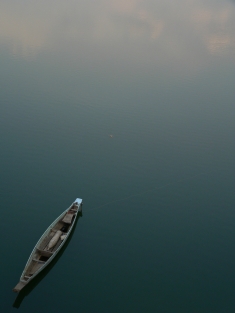Downstream Communities File Groundbreaking Complaint Over Don Sahong Dam
Mr X*, a 55-year-old fisherman from Kratie Province in Cambodia, seemed overwhelmed at first, and then he became concerned and angry. Before attending our meeting on the impacts of the Don Sahong Dam, he had heard nothing about the huge hydropower project now being built on the Mekong River in Laos, upstream from his village. As the meeting progressed, he began to speak out:
“I really worry about the dam’s impacts on our livelihoods, as we depend on catching fish and using water from the Mekong River for our farms. We have come to know that if it is built, the dam will harm the water and the fish and then it will impact our life.”
Our organization, EarthRights International (ERI), works to raise awareness about the impacts of large-scale dams and other developments in the Mekong region, and to support local people to voice concerns and protect their rights. We work with people who will be harmed by such projects, because the dam-building government agencies and private companies often do not inform people or enable their participation in decision-making.
One such project is the Don Sahong Dam, now being built in Laos. This project will completely block the main channel of the Mekong River for year-round fish migration, threatening the river’s diverse fish populations. Fish are an essential source of food for local people and fundamental to their lives, traditions and identities. The threat to fisheries is likely to have disastrous consequences. Affected villages in Cambodia – many already impoverished – rely on fish for up to 70% of their daily protein needs. Moreover, the project is poised to destroy the iconic Irrawaddy dolphins living in the area and disrupt water and sediment flows, which are critical for supporting downstream farming communities and the river’s delta.
When ERI began meeting with Cambodian villagers to conduct community consultations around the Don Sahong project, most knew very little about the project. None of the participants in ERI’s consultations had received any information from the project developers.
The dam is being built by Mega First Corporation Berhad, a Malaysian company, and the Lao Government. Flouting requirements under national and international laws, the developers failed to conduct an adequate assessment of project impacts up and downstream, including transboundary impacts that will affect Cambodia, Thailand and Vietnam. They ignored obligations to provide information to affected communities and respect their rights to consultation and participation in decision-making. No adequate proposals for mitigation or compensation for the dire impacts are included in the project plans.
Affected communities in Cambodia and their counterparts in Thailand had nowhere to turn for redress. The Mekong River Commission (MRC), the regional body for resolving disputes over transboundary uses of the Mekong River, does not have any mechanism to consider and address community concerns.
Pheau Moeung Khun, Commune Chief of Preah Romkel in Stung Treng Province, just 1.5km from the dam site in downstream Cambodia, described his community’s frustration with the lack of a complaint mechanism for communities affected by the dam: “I used to think that MRC should be the one who can help resolve transboundary problems happening on the Mekong River, but they communicate only through the country level, so is there any way that the community can raise our concerns? Who will listen to us?”
In collaboration with local NGO partners affiliated with the Rivers Coalition of Cambodia, ERI conducted consultations with over 200 community leaders and representatives from 33 villages, including indigenous and ethnic minority communities in Stung Treng and Kratie Provinces. The consultations provided a forum for local people to express concerns and support the development of a complaint against Mega First to SUHAKAM, the Malaysian National Human Rights Commission. Following the consultations, participants returned to their villages to circulate petitions in support of the complaint, garnering more than 2,000 signatures. Villagers gave personal testimonies and video statements. Additional consultations were conducted by ERI and local partners in Thailand. Thai communities living along the Mekong River joined the complaint.
The groundbreaking complaint was filed on 20 October 2014 and is now pending: the first ever received by SUHAKAM concerning human rights violations committed by a Malaysian company abroad. At the consultations, villagers had asked, “Who will speak for the communities? And who will listen to us?” In a powerful reply to their own questions, community representatives who had never left Cambodia, together with Thai community representatives, travelled to Kuala Lumpur to file the complaint and deliver their testimonies in person, appealing to SUHAKAM to investigate and to intervene with Mega First and the Malaysian government to halt the project and resolve concerns.
SUHAKAM will now consider whether they have jurisdiction to investigate the complaint, including the transboundary issues it raises. We hope that they will decide to follow the example of the Thai Human Rights Commission, which has already accepted jurisdiction in numerous transboundary cases, including that of the Xayaburi Dam, currently being built further upstream. Doing so would represent a critical step forward in helping address the lack of remedial mechanisms and access to justice for communities affected by such projects in the Mekong.
* His name has been changed to protect him.



